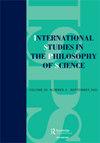Manipulative success and the unreal
IF 0.7
2区 哲学
Q2 HISTORY & PHILOSOPHY OF SCIENCE
International Studies in the Philosophy of Science
Pub Date : 2003-01-01
DOI:10.1080/0269859032000169451
引用次数: 27
Abstract
In its original form due to Ian Hacking, entity realism postulates a criterion of manipulative success which replaces explanatory virtue as the criterion of justified scientific belief. The article analyses the foundations on which this postulate rests and identifies the conditions on which one can derive a form of entity realism from it. It then develops in detail an extensive class of counterexamples, drawing on the notion of quasi-particles in condensed matter physics. While the phenomena associated with quasi-particles pass the entity realist's criterion of manipulative success, quasi-particles themselves are illusions, and can be seen to be so even on the basis of the largely non-theoretical “home truths” that one must be ready to admit as background knowledge. Hence, Hacking's entity realism is shown to be incoherent.操纵成功和虚幻
实体实在论的最初形式是由伊恩·哈金(Ian Hacking)提出的,它假定了一种操纵成功的标准,取代了解释的美德,作为证明科学信仰的标准。本文分析了这一假设所依据的基础,并确定了从中推导出实体实在论形式的条件。然后,它详细地发展了一个广泛的反例类,借鉴了凝聚态物理中的准粒子的概念。虽然与准粒子相关的现象通过了实体现实主义的操纵成功标准,但准粒子本身是幻觉,即使在很大程度上非理论的“真理”的基础上,人们也可以看到这一点,必须准备好承认这是背景知识。因此,哈金的实体现实主义是不连贯的。
本文章由计算机程序翻译,如有差异,请以英文原文为准。
求助全文
约1分钟内获得全文
求助全文
来源期刊

International Studies in the Philosophy of Science
HISTORY & PHILOSOPHY OF SCIENCE-
自引率
12.50%
发文量
10
期刊介绍:
International Studies in the Philosophy of Science is a scholarly journal dedicated to publishing original research in philosophy of science and in philosophically informed history and sociology of science. Its scope includes the foundations and methodology of the natural, social, and human sciences, philosophical implications of particular scientific theories, and broader philosophical reflection on science. The editors invite contributions not only from philosophers, historians, and sociologists of science, but also from researchers in the sciences. The journal publishes articles from a wide variety of countries and philosophical traditions.
 求助内容:
求助内容: 应助结果提醒方式:
应助结果提醒方式:


